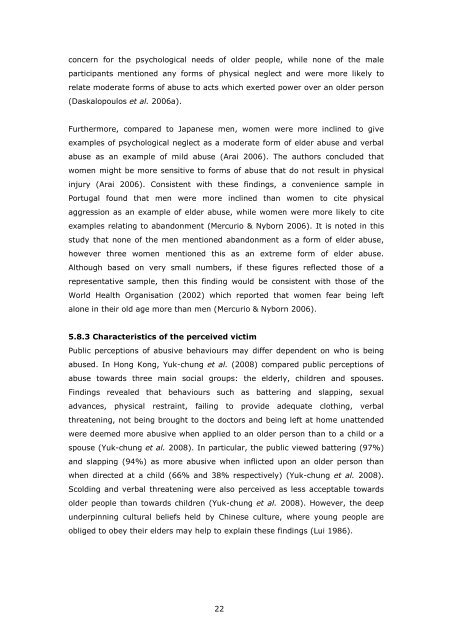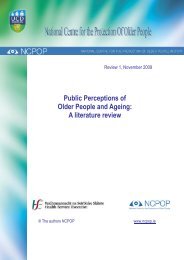Public Perceptions of Elder Abuse - Global Action on Aging
Public Perceptions of Elder Abuse - Global Action on Aging
Public Perceptions of Elder Abuse - Global Action on Aging
You also want an ePaper? Increase the reach of your titles
YUMPU automatically turns print PDFs into web optimized ePapers that Google loves.
c<strong>on</strong>cern for the psychological needs <str<strong>on</strong>g>of</str<strong>on</strong>g> older people, while n<strong>on</strong>e <str<strong>on</strong>g>of</str<strong>on</strong>g> the male<br />
participants menti<strong>on</strong>ed any forms <str<strong>on</strong>g>of</str<strong>on</strong>g> physical neglect and were more likely to<br />
relate moderate forms <str<strong>on</strong>g>of</str<strong>on</strong>g> abuse to acts which exerted power over an older pers<strong>on</strong><br />
(Daskalopoulos et al. 2006a).<br />
Furthermore, compared to Japanese men, women were more inclined to give<br />
examples <str<strong>on</strong>g>of</str<strong>on</strong>g> psychological neglect as a moderate form <str<strong>on</strong>g>of</str<strong>on</strong>g> elder abuse and verbal<br />
abuse as an example <str<strong>on</strong>g>of</str<strong>on</strong>g> mild abuse (Arai 2006). The authors c<strong>on</strong>cluded that<br />
women might be more sensitive to forms <str<strong>on</strong>g>of</str<strong>on</strong>g> abuse that do not result in physical<br />
injury (Arai 2006). C<strong>on</strong>sistent with these findings, a c<strong>on</strong>venience sample in<br />
Portugal found that men were more inclined than women to cite physical<br />
aggressi<strong>on</strong> as an example <str<strong>on</strong>g>of</str<strong>on</strong>g> elder abuse, while women were more likely to cite<br />
examples relating to aband<strong>on</strong>ment (Mercurio & Nyborn 2006). It is noted in this<br />
study that n<strong>on</strong>e <str<strong>on</strong>g>of</str<strong>on</strong>g> the men menti<strong>on</strong>ed aband<strong>on</strong>ment as a form <str<strong>on</strong>g>of</str<strong>on</strong>g> elder abuse,<br />
however three women menti<strong>on</strong>ed this as an extreme form <str<strong>on</strong>g>of</str<strong>on</strong>g> elder abuse.<br />
Although based <strong>on</strong> very small numbers, if these figures reflected those <str<strong>on</strong>g>of</str<strong>on</strong>g> a<br />
representative sample, then this finding would be c<strong>on</strong>sistent with those <str<strong>on</strong>g>of</str<strong>on</strong>g> the<br />
World Health Organisati<strong>on</strong> (2002) which reported that women fear being left<br />
al<strong>on</strong>e in their old age more than men (Mercurio & Nyborn 2006).<br />
5.8.3 Characteristics <str<strong>on</strong>g>of</str<strong>on</strong>g> the perceived victim<br />
<str<strong>on</strong>g>Public</str<strong>on</strong>g> percepti<strong>on</strong>s <str<strong>on</strong>g>of</str<strong>on</strong>g> abusive behaviours may differ dependent <strong>on</strong> who is being<br />
abused. In H<strong>on</strong>g K<strong>on</strong>g, Yuk-chung et al. (2008) compared public percepti<strong>on</strong>s <str<strong>on</strong>g>of</str<strong>on</strong>g><br />
abuse towards three main social groups: the elderly, children and spouses.<br />
Findings revealed that behaviours such as battering and slapping, sexual<br />
advances, physical restraint, failing to provide adequate clothing, verbal<br />
threatening, not being brought to the doctors and being left at home unattended<br />
were deemed more abusive when applied to an older pers<strong>on</strong> than to a child or a<br />
spouse (Yuk-chung et al. 2008). In particular, the public viewed battering (97%)<br />
and slapping (94%) as more abusive when inflicted up<strong>on</strong> an older pers<strong>on</strong> than<br />
when directed at a child (66% and 38% respectively) (Yuk-chung et al. 2008).<br />
Scolding and verbal threatening were also perceived as less acceptable towards<br />
older people than towards children (Yuk-chung et al. 2008). However, the deep<br />
underpinning cultural beliefs held by Chinese culture, where young people are<br />
obliged to obey their elders may help to explain these findings (Lui 1986).<br />
22









